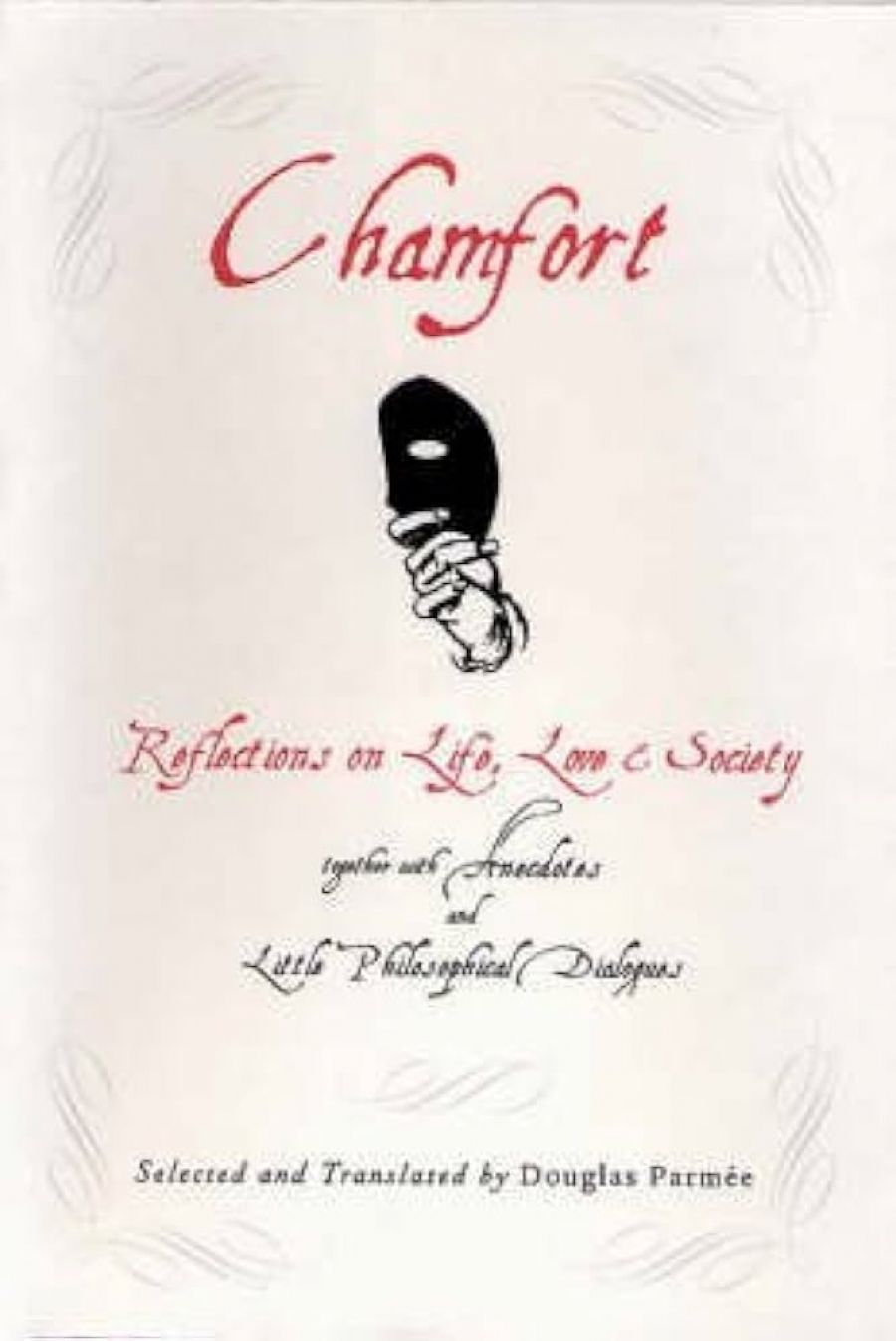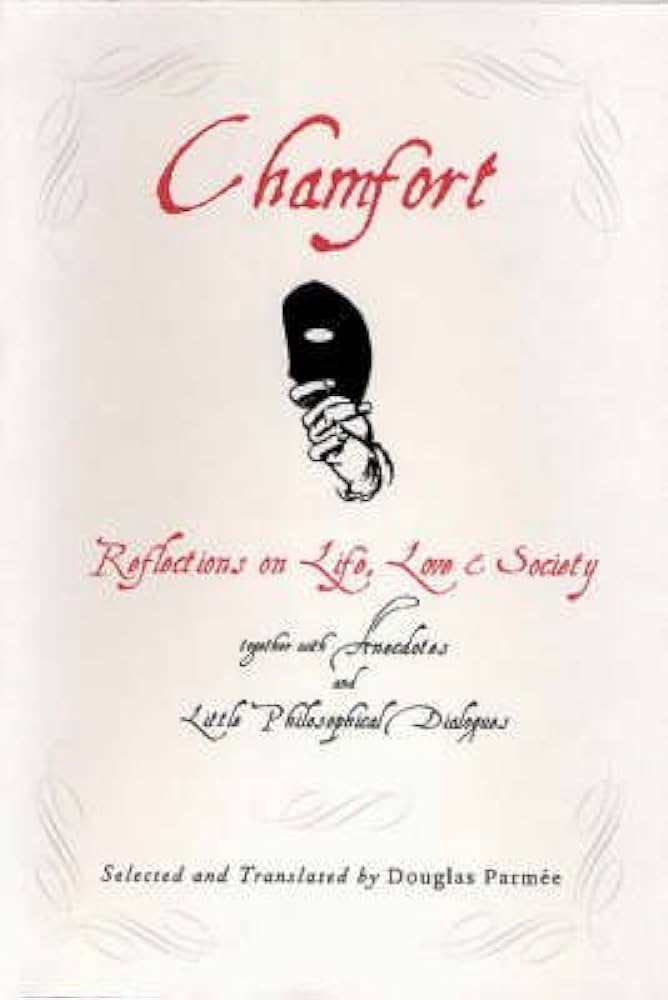
- Free Article: No
- Contents Category: Philosophy
- Custom Article Title: Nothing but the truth
- Review Article: Yes
- Article Title: Nothing but the truth
- Online Only: No
- Custom Highlight Text:
'Anyone who’s not a misanthrope by the time he’s forty has never felt the slightest affection for the human race.’ It was apparently at this time of life that Nicolas-Sébastien Roch de Chamfort (1740–94) began jotting down his thoughts, reflections and anecdotes. As the above sample indicates, Chamfort’s life of excess and disappointment had equipped him with a heightened sensitivity to paradox, folly and absurdity. His massive, albeit fragmentary, literary output was only discovered after his death, and until now has not been available in any substance to readers outside the French-speaking world.
- Book 1 Title: Reflections on Life, Love and Society
- Book 1 Biblio: Short Books, $29.95 hb, 224 pp
- Book 1 Cover Small (400 x 600):

- Book 1 Cover (800 x 1200):

It could be that the aphorism, in common with certain other literary forms, has suffered from the postwar flattening of culture in the West. Perhaps the aphorism and allied forms such as the maxim and epigram, which in Europe came into their own during the seventeenth and eighteenth centuries, have already been raised to the highest possible art, which only bears repeating.
The aphorism is to its poor relation the proverb what the symphony is to the advertising jingle. Despite the enduring popularity of proverbs, as sources of wisdom they are nothing more than fool’s gold. What’s more, they have a habit of contradicting one another: for every ‘Great minds think alike’, there’s an ‘Idiots seldom differ’. The best-known proverbs arguably aren’t even true, and they certainly lack moral depth or intellectual sophistication. Aphorisms and their ilk, by contrast, tell us nothing but the truth, which is perhaps another reason why, in the era of the therapist and the spin doctor, they are so conveniently overlooked. Just because a saying is well-worn, Chamfort reminds us, doesn’t mean that it is also wise: ‘Posterity merely consists of the opinion of a series of publics; and just look at today’s!’
Chamfort consistently shows that he has not dated at all, and can indeed be startlingly prescient. For example, this on the tyranny of so-called experts: ‘Economists are like surgeons who have two scalpels, one with a very sharp edge, the other with a very jagged edge; with the first, they do splendid autopsies on the dead; with the latter, they perform excruciating operations on the living.’
Other observations operate on a slower, but no less devastating, fuse: ‘It’s generally held that the best way to achieve success is to be agreeable. But an infinite capacity to be bored gives far better results; making money as well as success with women can be reduced almost entirely to this gift.’ Boredom, incidentally, may also be a condition of intellectual brilliance. Chamfort’s statement chimes with a recent newspaper article by Germaine Greer on why she could never again live in Australia. Greer decided to become an expatriate, she says, at the age of twelve: ‘I had been bored ever since I could remember.’ She seems to want to blame her homeland for this state of affairs, but Chamfort’s idea suggests another, possibly more rational, explanation.
Although Chamfort was a star of the Paris salon due to his looks, intelligence and charm, according to Parmée he had an Achilles heel due to his illegitimate birth: ‘My miserable experiences as a young man provided me with a protective armour against all those that came later.’ His stance, he says elsewhere, is that of a perpetual outsider: ‘In society there are very few things which any decent man can feel comfortable with, in his heart or his mind.’
Joseph Epstein has likened the somewhat astringent flavour of Chamfort’s words to that of Greek olives. Opinions on this issue will vary: to this reviewer, Chamfort’s work tastes more like capers, French or otherwise.
The opportunity to savour the writer whom Nietzsche regarded as the ‘wittiest of all moralists’ is provided by Adelaide-based translator Douglas Parmée. Chamfort wrote a great deal, but most of his best stuff is no longer than a sentence or two. In this, he forms part of the tradition that includes Pascal, La Rochefoucauld, Goethe, Swift and Wilde, and might also encompass such figures as Heraclitus and Confucius. Chamfort is conscious of this tradition, and occasionally takes issue with it: ‘It’s not true, as Rousseau claimed, following Seneca, that the more you think, the less you feel; but it is true that the more you judge, the less you love.’ Any suspicion that Chamfort has gone soft all of a sudden is immediately dispelled: ‘Few people tempt you to make any exception to this rule.’
Although this selection of nearly 500 pieces is necessarily fragmentary, Parmée has arranged the texts in such a way as to suggest certain preoccupations. One of the main ones is love. The unrequited passion Chamfort had for the theatre – he was an unsuccessful playwright – extended to actresses. It was during this unhappy association that Chamfort apparently contracted a sexually transmitted disease called granulomatosis, a condition that, in Parmée’s description, is every bit as nasty as the name suggests.
By turns witty, cynical and wise, despairing and hopeful, Chamfort’s reflections are always stimulating and frequently enlightening. As he affirms: ‘Thinking offers consolation for everything. Even if it sometimes makes you feel sad, use it to cure your sadness and it will.’ Then again, too much thinking can be a health hazard: ‘Anxiety and indecision are for the mind and the spirit what torture is for the body.’


Comments powered by CComment